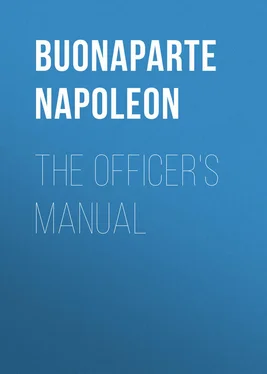Buonaparte Napoleon - The Officer's Manual
Здесь есть возможность читать онлайн «Buonaparte Napoleon - The Officer's Manual» — ознакомительный отрывок электронной книги совершенно бесплатно, а после прочтения отрывка купить полную версию. В некоторых случаях можно слушать аудио, скачать через торрент в формате fb2 и присутствует краткое содержание. Издательство: Иностранный паблик, Жанр: foreign_antique, foreign_prose, Биографии и Мемуары, на английском языке. Описание произведения, (предисловие) а так же отзывы посетителей доступны на портале библиотеки ЛибКат.
- Название:The Officer's Manual
- Автор:
- Издательство:Иностранный паблик
- Жанр:
- Год:неизвестен
- ISBN:нет данных
- Рейтинг книги:5 / 5. Голосов: 1
-
Избранное:Добавить в избранное
- Отзывы:
-
Ваша оценка:
- 100
- 1
- 2
- 3
- 4
- 5
The Officer's Manual: краткое содержание, описание и аннотация
Предлагаем к чтению аннотацию, описание, краткое содержание или предисловие (зависит от того, что написал сам автор книги «The Officer's Manual»). Если вы не нашли необходимую информацию о книге — напишите в комментариях, мы постараемся отыскать её.
The Officer's Manual — читать онлайн ознакомительный отрывок
Ниже представлен текст книги, разбитый по страницам. Система сохранения места последней прочитанной страницы, позволяет с удобством читать онлайн бесплатно книгу «The Officer's Manual», без необходимости каждый раз заново искать на чём Вы остановились. Поставьте закладку, и сможете в любой момент перейти на страницу, на которой закончили чтение.
Интервал:
Закладка:
Emperor of the French Napoleon I
The Officer's Manual / Napoleon's Maxims of War
“After refreshing my memory by looking over again ‘The Officer’s Manual,’ or ‘Maxims of Napoleon,’ I think I may safely recommend the republication, in America, of the work in English, as likely to be called for by many officers, regular and volunteer. It contains a circle of maxims, deduced from the highest source of military science and experience, with practical illustrations of the principles taken from the most celebrated campaigns of modern times. The study of the book cannot fail to set all young officers on a course of inquiry and reflection greatly to their improvement.
“WINFIELD SCOTT.”The publisher has reissued this little volume as a publication timely for the occasion. A collection of maxims which directed the military operations of the greatest captain of modern times, cannot fail to prove of great use to such young officers as really desire a knowledge of the art of war. The maxims are illustrated by instances drawn from the campaigns of Gustavus Adolphus, Turenne, Frederick, and Napoleon. These great men were all governed by the same principles, and it is by applying these principles to the perusal of their respective campaigns, that every military man will recognize their wisdom, and make such use of them hereafter as his own particular genius shall point out.
“And here, perhaps,” says the translator, Col. D’Aguilar, “my task might have been considered finished; but perceiving how incomplete the collection was alone, I have endeavored to supply the deficiency by having recourse for further illustration to the memoirs of Montécuculli, and the instructions of Frederick to his generals. The analogy of their principles with those of Napoleon, has convinced me that the art of war is susceptible of two points of view: one, which relates entirely to the acquirements and genius of the general; the other, which refers to matters of detail.
“The first is the same in all ages, and with all nations, whatever be the arms with which they fight. Hence it follows that, in every age, great commanders have been governed by the same principles.
“The business of detail, on the contrary, is controlled by existing circumstances. It varies with the character of a people, and the quality of their arms.
“It is with a view to impress the justice of this remark, that I have sought for facts in different periods of history, to illustrate these maxims, and to prove that nothing is problematical in war; but that failure and success in military operations depend almost always on the natural genius and science of the chief.”
MAXIM I
The frontiers of states are either large rivers, or chains of mountains, or deserts. Of all these obstacles to the march of an army, the most difficult to overcome is the desert; mountains come next, and broad rivers occupy the third place.
Napoleon, in his military career, appears to have been called upon to surmount every difficulty which can occur in wars of invasion.
In Egypt he traversed deserts, and vanquished and destroyed the Mamelukes, so celebrated for their address and courage. His genius knew how to accommodate itself to all the dangers of this distant enterprise, in a country ill adapted to supply the wants of his troops.
In the conquest of Italy, he twice crossed the Alps by the most difficult passes, and at a season, too, which rendered this undertaking still more formidable. In three months he passed the Pyrenees, defeated and dispersed four Spanish armies. In short, from the Rhine to the Borysthenes, no natural obstacle could be found to arrest the rapid march of his victorious army.
MAXIM II
In forming the plan of a campaign, it is requisite to foresee everything the enemy may do, and to be prepared with the necessary means to counteract it.
Plans of campaign may be modified ad infinitum according to circumstances – the genius of the general, the character of the troops, and the topography of the theatre of action.
Sometimes we see a hazardous campaign succeed, the plan of which is directly at variance with the principles of the art of war. But this success depends generally on the caprice of fortune, or upon faults committed by the enemy – two things upon which a general must never count. Sometimes the plan of a campaign, although based on sound principles of war, runs the risk of failing at the outset if opposed by an adversary who acts at first on the defensive, and then, suddenly seizing the initiative, surprises by the skilfulness of his manœuvres. Such was the fate of the plan laid down by the Aulic council for the campaign of 1796, under the command of Marshal Wurmser. From his great numerical superiority, the marshal had calculated on the entire destruction of the French army, by cutting off its retreat. He founded his operations on the defensive attitude of his adversary, who was posted on the line of the Adige, and had to cover the siege of Mantua, as well as central and lower Italy.
Wurmser, supposing the French army fixed in the neighborhood of Mantua, divided his forces into three corps, which marched separately, intending to unite at that place. Napoleon, having penetrated the design of the Austrian general, perceived the advantage to be derived from striking the first blow against an army divided into three corps, with no communication between them. He hastened, therefore, to raise the siege of Mantua, assembled the whole of his forces, and by this means became superior to the imperialists, whose divisions he attacked and beat in detail. Thus Wurmser, who fancied he had only to march to certain victory, saw himself compelled, after ten days campaign, to retire with the remains of his army into the Tyrol, after a loss of twenty-five thousand men in killed and wounded, fifteen thousand prisoners, nine stand of colors, and seventy pieces of cannon.
Hence, nothing is so difficult as to prescribe beforehand to a general the line of conduct he shall pursue during the course of a campaign. Success must often depend on circumstances that cannot be foreseen; and it should be remembered, likewise, that nothing cramps so much the efforts of genius as compelling the head of an army to be governed by any will but his own.
MAXIM III
An army which undertakes the conquest of a country, has its two wings resting either upon neutral territories, or upon great natural obstacles, such as rivers or chains of mountains. It happens in some cases that only one wing is so supported; and in others that both are exposed.
In the first instance cited, viz., where both wings are protected, a general has only to protect his front from being penetrated. In the second, where one wing only is supported, he should rest upon the supported wing. In the third, where both wings are exposed, he should depend upon a central formation, and never allow the different corps under his command to depart from this: for if it be difficult to contend with the disadvantage of having two flanks exposed, the inconvenience is doubled by having four , trebled if there be six – that is to say, if the army is divided into two or three different corps. In the first instance, then, as above quoted, the line of operation may rest indifferently on the right or on the left. In the second, it should be directed toward the wing in support. In the third, it should be perpendicular to the centre of the army’s line of march. But in all these cases it is necessary, at a distance of every five or six days march, to have a strong post or an entrenched position upon the line of operation, in order to collect military stores and provisions, to organize convoys, to form of it a centre of movement, and establish a point of defence to shorten the line of operation of the army.
Читать дальшеИнтервал:
Закладка:
Похожие книги на «The Officer's Manual»
Представляем Вашему вниманию похожие книги на «The Officer's Manual» списком для выбора. Мы отобрали схожую по названию и смыслу литературу в надежде предоставить читателям больше вариантов отыскать новые, интересные, ещё непрочитанные произведения.
Обсуждение, отзывы о книге «The Officer's Manual» и просто собственные мнения читателей. Оставьте ваши комментарии, напишите, что Вы думаете о произведении, его смысле или главных героях. Укажите что конкретно понравилось, а что нет, и почему Вы так считаете.












